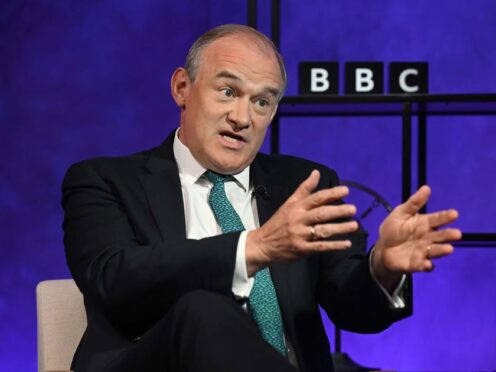Liberal Democrat leader Sir Ed Davey has said that if electoral change leads to Reform UK getting more seats, then “so be it”.
Sir Ed’s party has long advocated for a system of proportional representation which they say would make “seats won match votes cast” and facilitate “politicians having to work together”.
Reform UK leader Nigel Farage is also calling for electoral change, as his party’s thin voter base spread across the country could see their millions of votes predicted by pollsters translated into just a handful of MPs.
During his Panorama interview on BBC One, Sir Ed was asked if it would “be fairer” for Reform UK to get more seats under a new electoral system.
He said: “Well the Liberal Party and the Liberal Democrats for over a 100 years have supported fair votes and the reason we do is because millions of people vote, they’re going to vote on July 4 and because their vote only counts in their constituency, it’s not going to impact the future government and the future parliament and we think that is wrong.
“So… we believe in fair votes and therefore you take the democratic response and if that means parties who I don’t agree with or I don’t share anything in common get more MPs, so be it. That is democracy.”

Responding to the suggestion that the rise of far-right parties under systems of proportional representation across Europe puts a dampener on the appeal of electoral reform, Sir Ed said: “Polls suggest that more people are finding it attractive.”
He continued “Here’s the point, as a democrat I want to debate with people who I disagree with.
“I’ve done that all my life and you only win the debate, and I believe in this election we’re winning the debate on things like health and care and sewage and the cost of living, you only win the debate if people who don’t share your views are there to debate with you.”
He added: “So I’m happy, it doesn’t matter where they’re from, it could be from any party to be frank with you, I’m happy to debate with them.”
Sir Ed clarified that he does not “share any values” with Mr Farage and wanted to make sure people “understand” Lib Dem values.
He continued: “Because I think when they do, when they listen to us and hear us and get the chance, I think it will be, we’ll be winning a lot more votes.
“One of the problems in modern politics actually is, if you are, say something outrageous, you get covered. When you say something that’s sensible and reasonable, that actually has a solution for people’s problems, you don’t get covered.”
Sir Ed served as a cabinet minister in the Cameron–Clegg coalition government that has been heavily critiqued in subsequent years for implementing austerity cuts to public services.

Asked why he has never criticised austerity, Sir Ed said “tough decisions” had to be made.
He said: “I had a choice, as did every Liberal Democrat minister, did I stay there or did I go?
“I think it could have been quite easy to go, and criticise the government from the media studios, and then potentially get re-elected, rather than losing my seat in 2015.
“I, as many other colleagues did, we rolled up our sleeves and tried to fight for the things we fought for.
“And we stopped the Conservatives doing some things. The clearest example is on welfare, the budget after we left office and the Conservatives running by themselves, George Osborne cut the welfare bill by £12 billion, and we clearly stopped that.”
He added: “I am not proud of every decision I had to take, but my point is if you wanted to change things, you had to roll up your sleeves and not quit. And we stood there and we sat there, and we argued our case and I’m really proud of things we achieved.”
The Lib Dems’ notorious U-turn on abolishing student tuition fees was “probably the most difficult” decision made in the coalition era, Sir Ed said.
He said: “The Liberal Democrats got punished, I lost my seat, along with many, many colleagues, and we’ve had three tough elections.”
